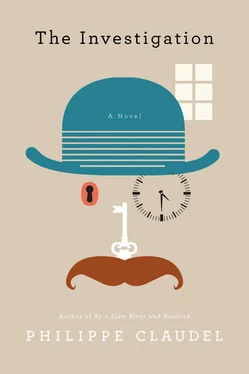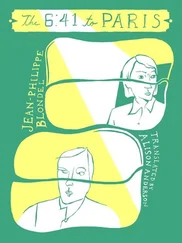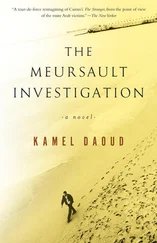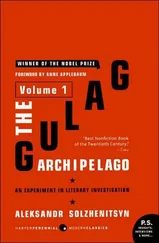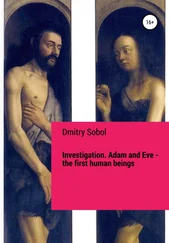But when he spotted a recess in the wall about two hundred yards to his left, on the other side of the street, he was strangely captivated by the sight and broke off his reverie. Yes, that wide angle, that break in the even line of the wall — there was no doubt about it — had to be the entrance. The entrance to the Enterprise. The entrance where the Guardhouse was located. And to think that the Hotel was barely a minute away. He’d needed several hours to trudge from one to the other, and by God knew what impossible route. It was pretty laughable. The Investigator felt almost euphoric.
He went down the four steps to the sidewalk and looked for a pedestrian crossing area where he could get across the street. But it was no use. He scanned his surroundings as carefully as he could, bending down until his face was at ground level, peering past the legs of the pedestrians and under the wheels of the passing vehicles in an attempt to catch sight of the distinctive white stripes, then going back up the four steps and standing on tiptoe on the top one, trying to descry a traffic light, whether near or far, but, try as he might, he could discover no crossing anywhere.
The Investigator pondered for a few moments, told himself he’d lost enough time already, and resolved to cross the stream of vehicles. It shouldn’t be much of a problem, he thought, given their greatly reduced speed.
THE INITIAL PROBLEM, whose difficulty he had in fact totally underestimated, was to get to the edge of the sidewalk, that is, to traverse the moving, compact mass of men and women who were hurrying past him. They formed a sort of border, two or three yards wide, with a dense, mobile, quietly hostile texture.
At first, the Investigator tried various forms of apology, all uttered in a loud voice and accompanied by modest gestures expressing his desire to pass. Those proved ineffective, as did all his demonstrations of the most consummate politeness; no one stopped, no one shifted position to allow him to slip between the moving bodies. The men and women walking hurriedly along didn’t look at him, either. Many of them were wearing headphones or had earpieces stuck in their ears; others, also very numerous, were sending messages or receiving calls on a kind of mobile telephone with a single button, identical to the phone the Policeman carried.
The Investigator told himself that in these conditions he would have to grit his teeth and force his way through. The time had come for him to stop hesitating and start using his elbows, even if that meant stepping on a few feet or jostling some pedestrians. In any case, he’d had it with people not paying attention to him. He took a deep breath and plunged in.
It was a strange stampede. There was no aggressiveness in its forward surge — a great throng of bodies moving implacably along without outcries, without insults, without inappropriate gestures, without hatred — but it was fraught with mute, extreme, perplexing violence. The Investigator had two distinct, simultaneous impressions: that he was swimming in a torrent of tumultuous water, and that he was being pushed by a bulldozer made of some soft and yielding material. He thrashed, grabbed, scratched, seized, released, yelled, cried, apostrophized, groaned, begged, even abased himself. He exhibited an energy that he summoned up from his very depths. Finally, he reached the curb.
His effort had truly been as enormous as the distance covered was small. Out of breath, he noticed that his raincoat, which already looked like an old, badly ironed sheet, had greatly suffered in the struggle: The right pocket had been torn, and a flap of fabric was hanging down like a big dog’s ear, soft and ungainly. He wasted no time bemoaning the loss, for he still had to make his way across the stream of vehicles.
The Investigator raised his hand and gestured in the direction of the first vehicle to his left, signaling to the driver that he was going to cross the street, but he hadn’t gone more than two or three steps, just enough to get past the first car and prepare to slip between the next two, when innumerable automobile horns started blowing all at once, setting up a racket that petrified him.
The noise was so outrageously loud that he wondered whether it could actually be real. He reopened his eyes — he’d shut them, as if reflexively, a few seconds earlier — and saw that all the vehicles had stopped moving. In each of them, the driver, whether a man or a woman, was sounding the horn most ferociously, and worst of all, worst of all, every one of those drivers, dozens, hundreds of drivers, was looking at him, the Investigator, frozen in place among the vehicles.
Cold sweat ran down the nape of his neck. All at once, the horns stopped. But immediately, the sound of thousands of voices — mingled, concurrent, united — rose from the sidewalks in a phenomenal hubbub. It was as if all the spectators in a stadium had started shouting at the same time. And as with the vehicles, all the men and women on the sidewalks, people who a few moments ago had been hurrying along in order and silence, maintaining an even, regular pace, absorbed in their own thoughts, their own music, their telephone conversations, and not in the least concerned with their surroundings — they had all stopped short, and they were all looking at him and shouting inaudible words in his direction, inaudible because they collided with, smashed against, shattered upon one another, distorted by the ricochets of their ground-up syllables. He panicked, tottered, barely caught himself by leaning on the hood of a car, and then turned back and stepped up onto the sidewalk he’d stepped off of less than a minute before.
He was trembling. All interest in him had ceased. On the street, the vehicles were slowly streaming past, their drivers’ eyes staring straight ahead. Similarly, on both sidewalks, people had begun to walk again. Order had retuned everywhere. But what kind of order?
Imperceptibly, the Crowd caught him up in its movement. There was no resisting it. Even before his brain could decide, his legs had adopted the rhythm of the other legs around them. Now he was walking, too, and in the direction dictated by the Crowd, even though that direction was wrong, since it took him off to the right, whereas the entrance to the Enterprise, the Guardhouse, was over there, a few hundred yards away, on the left.
HIS EXPERIENCES WHILE HE WAS involuntarily adrift in the Crowd were without a doubt the strangest he’d gone through since his arrival in the City. When he allowed himself to be carried away like a wisp of straw on the current of a mighty river, the Investigator surrendered. For the first time in his existence, he gave up thinking of himself as an individual with a free will and freedom of choice, residing in a country that guaranteed fundamental human rights, so fundamental that most of the time its citizens, including the Investigator, enjoyed those rights without being fully conscious of them. Dissolved in the immense, moving mass of silent pedestrians, he slid along, stopped thinking, refused to analyze the situation, made no effort to fight it. It was almost as though he’d abandoned his body in order to enter into another body, vast and limitless.
How long did it all last? Who could really know? Not the Investigator, in any case, and that was for sure. He no longer knew very much. Like a man afflicted by a powerful psychotropic drug, he’d forgotten his raison d’être. He continued to exist, but weakly. He was losing thickness.
It started to get cooler again, and then it abruptly became cold. The sky was covered with a gray veil from which a few snowflakes soon escaped. Two or three of them, little, icy, ephemeral points, fell on the Investigator’s head and brought him back to his present condition. Shivering, he realized that a sign was becoming visible up ahead in the distance, above the flowing masses of people and vehicles: a hotel sign, his Hotel’s sign, the sign for the Hope Hotel. He told himself it had come to this: His perceptions were obviously in total disarray. He’d thought the Crowd had been sweeping him along for hours, but in fact he hadn’t gone very far at all.
Читать дальше
